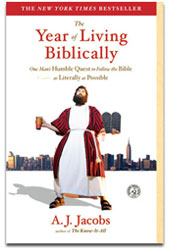| I’ve been reading The Year of Living Biblically, by A.J. Jacobs
for a book club that I will be attending. Though I’m not yet finished I recognize that this book has been out for a while, and that for many it is old news…I had been intrigued by it, but had never gotten around to it. Thus the deadline for a book club was a helpful prompt to get me to do something I really wanted to do…not unlike how trying to obey some obscure biblical law prompted Jacobs to be able to live a life that he wanted to. |
 |
A.J. Jacobs is a Jewish agonistic, and as he sets out to follow as many of the directives found in the Hebrew and Christian Scripture, his cynicism is challenged in unexpected ways:
On praying (which, as you might imagine, is a challenge for an agnostic!)—I no longer dread prayer. And sometimes I’m even like it….The prayers are helpful. They remind me that the food didn’t spontaneously generate in my fridge. They make me feel more connected, more grateful, more grounded, more aware of my place in this complicated hummus cycle. They remind me to taste the hummus instead of shoveling it into my maw like it’s a nutrition pill. And they remind me that I’m lucky to have food at all. Basically, they help me get outside of my self-obsessed cranium. I’m not sure this is what the Bible intended, but it feels like a step forward. (p. 94-96)
On wearing white (as commanded in Ecclesiastes 9:8): …it’s a bizzare sensation walking around the Upper West Side [of New York] in white garments…my regular wardrobe is made up mostly of bleak colors: blacks, browns, a daring splash of navy blue. It seems to suit the city’s soot and cynicism. Dark Clothes for a dark city….But the thing is, I’m enjoying it. My white wardrobe makes me feel lighter, more spiritual. Happier. It’s further proof of a major theme of this year: The outer affects the inner. Behavior shapes your psyche as much as the other way around. Clothes make the man….I should have been wearing all white from day one, but it was one of those rules I felt I had to build up to. Now that I’m doing, I don’t want to stop. (p. 123)
On sacrifice: A.J. participates in the kaparot ritual, a Jewish tradition practiced by some in which chickens are purchased by the participant, and the chicken is carried by the person to the slaughterer to be killed (with the chicken then packaged and given to the needy) “I’m elbowed out of the way. I’m still in my city-boy stupor: My chicken was alive; now, three knife strokes later, it’s dead. Epstein is saying something, but I can’t really focus. I’m too dazed. As I said, I’ve started to look at life differently. When you’re thanking God for every little joy—every meal, every time you wake up, every time you take a sip of water—you can’t help but be more thankful for life itself, for the unlikely and miraculous fact that you exist at all.” (p. 165)
Repeatedly, the author begins to follow a Biblical law as part of this interesting project. He does so in order to embrace the experience and is often surprised by the hidden value in experiencing the law. Some (like the chicken sacrifice) he knows he won’t repeat, but the experience has him be more mindful of the moment through prayer, through listening and observing others that he would otherwise ignore, by trying strategies and ways of thinking—being honest, generous and so on—that he could otherwise rationalize avoid. The mindfulness has him appreciating life, feeling more connected, and discovering value in timeless traditions which he had previously dismissed.
I like the playfulness of the book as he tries to follow a variety of Biblical commandments, admits when he has trouble being open to it, and allowing himself to be changed. The willingness to try new behaviors and learn from the experience is one which I particularly honor, being in the counselling business. He discovers himself growing: “I guess it’s called mindfulness. Or being in the moment, or making the mundane sacred. Whatever it is, I’m doing it more. Like the ridiculously extended thank you list for my hummus, the fruit taboo made me more aware of the whole cherry process, the seed, the soil, the five years of watering and waiting. That’s the paradox: I thought religion would make me live with my head in the clouds, but as often as not, it grounds me in this world.” (p. 172)
Mr.Jacobs…you mention that you google yourself sometimes to find out when people write about you on the net. If you see this…thanx for writing your book. I’m thinking a lot about how open I am to age old wisdom, to how aware I am of all the wonder around me, to the value of being thankful and more.It’s prompting me to be more mindful. Good food for thought! Now I’m off to finish the book.






Write a Comment